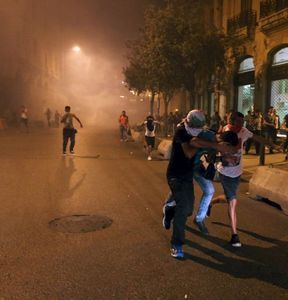Gunfire, tear gas as Lebanese police fight Beirut protesters
Police firing tear gas, rubber bullets and water cannons battled thousands of Lebanese protesters Saturday demonstrating against government corruption and political dysfunction amid a trash crisis, with the sound of gunfire echoing through the streets into the night. Riot police used batons to beat back protesters among downtown Beirut’s Ottoman-era buildings and lavish apartment complexes, while others were carried away, overcome by tear gas. Police and security forces cordoned off the centre of the capital, around the parliament and government buildings, to thwart the biggest protest in recent months against authorities. Police said 35 people, including protesters and police, were injured. "The people want the overthrow of the regime,“ said protesters using the famous chants made by Arab protesters during the height of popular protests that swept the region after 2011 and toppled several longstanding rulers.
Protesters are calling the security forces ‘shabiha’ [thugs] for their heavy handed action against the protest.
Al Jazeera reporter Nour Samaha
Last month the country was left with mounting piles of rubbish after politicians, divided by regional and local conflict, were unable to agree where to dump the capital’s refuse. The crisis was temporarily resolved when the rubbish was finally cleared but bickering within the government over which company to award the new contract has exposed it to allegations of corruption from opponents. The crisis echoes wider problems facing Lebanon, with the state long criticized for failing to develop the country and its infrastructure. Beirut still suffers daily power cuts 25 years after the end of the 1975-1990 civil war. Protesters called for the resignation of the government, blaming it for worsening the country’s political paralysis. But government has been particularly poor since the eruption of the war in neighbouring Syria. That conflict has exacerbated Lebanon’s political divisions, often along sectarian lines that reflect the Syrian conflict. The presidency has been vacant for more than a year, and the parliament elected in 2009 has extended its own term and postponed elections until 2017 on the grounds of instability.

Middle East YouStink